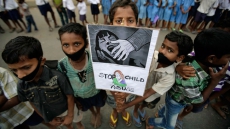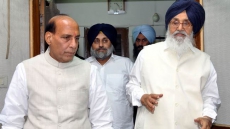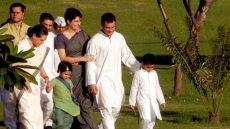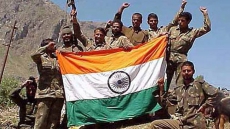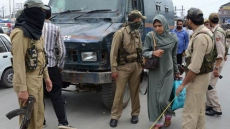Are the fringes pulling at the centre from many directions? Is the NDA government of Prime Minister Narendra Modi facing its first major political challenge, not from a depleted opposition, but from its own ranks? Or is it just a political ploy of the Hindu right, led by the RSS, to push its nationalist agenda through a government it considers its own?
Answers are difficult, but statements and actions of many BJP lawmakers, in parliament and the state assemblies, the actions of its allies and of various front organisations, have led to wide apprehensions that the country's secular principles, enshrined in its constitution, might be under attack. And this has found echo in parliament and the media in recent days.
The first major instance occurred on June 2 when a Muslim techie Shaikh Mohasin Sadiq was killed in Pune, allegedly by Hindu Rashtra Sena activists over the uploading of "derogatory" pictures of Maratha icon Shivaji and Shiv Sena supremo Bal Thackeray on a social networking site.
Reacting to the killing, Pune BJP MP Anil Shirole commented that "some amount of repercussions was natural". Later, it was found that Sadiq was not connected with the mischief.
The recent attempt to force-feed a fasting Muslim employee of Maharashtra Sadan by Shiv Sena MPs when he was observing Ramadan fast, Telangana BJP leader K. Laxman's questioning tennis star Sania Mirza's Indian-ness, and Goa cabinet minister Deepak Dhavalikar's exhortation to Modi to make India a Hindu state and supported by his cabinet colleague and state deputy chief minister Francis D'Souza that India is a Hindu nation and he considers himself a "Christian Hindu", have rekindled debate whether the Bharatiya Janata Party (BJP) has the ability or the intention to carry all communities together.
Congress MP Shashi Tharoor feels that as Modi has chosen to keep quiet on the utterances by the fringe elements it could leave an impression that he condones them.
"I believe the prime minister is missing an opportunity to send a signal of reassurance to a vulnerable minority that there is no communal agenda in his party," Tharoor told IANS.
"The fact that so many seemingly localised but nonetheless disturbing incidents have occurred without a single word from Mr. Modi leaves the impression that he condones what is being said and done by these fringe elements of the Sangh Parivar."
While the NDA government earmarked Rs.3,734 crore for the Minority Affairs ministry in the current fiscal year, a considerable Rs. 604 crore higher than by the UPA in 2013-14, and set aside Rs.100 crore for modernisation and skill upgradation of madrasas, its position vis-a-vis the Muslim community has invited controversy ever since its inception on May 26 this year.
"Contrary to what they promised, the BJP never had any agenda of economic development. They do not have any vision for women empowerment or uplifting the poor. So, it's quite natural that they are back to their primary agenda of asserting their religious identity," Congress leader Bhakta Charan Das told IANS.
The Congress is also alleging that that these routinely inadmissible comments made by BJP leaders or allies are in fact a well thought of ploy to reap electoral dividends on communal lines in the forthcoming assembly elections in Maharashtra, Jammu and Kashmir, Jharkhand and Haryana.
"It was started by Narendra Modi, who gave polarising speeches in Assam and West Bengal and openly talked of 'pink revolution' to inflame religious sentiment. Today whatever you hear from BJP state leaders is in imitation of Modi. They are convinced that communalising the environment is the easiest way to win an election," Congress General Secretary Shakeel Ahmad said.
The BJP top leadership is providing grounds for such allegations by refusing to comment on radical statements made by their juniors or allies.
When IANS contacted Union Minister for Minority Affairs Najma Heptulla for her reaction to Goa minister Deepak Dhavalikar's rhetoric, she refused to comment.
"I don't need to react to individual statements made by some state leaders," Heptulla told IANS.
Modi, an active Twitterati who reacted keenly on every policy failure of the outgoing UPA government, has not reacted either.
"Modi is not tweeting on these issues because he has achieved his end (of becoming the prime minister). At any rate, where is the need for him to react to developments which are in tune with the character and capacity of the BJP?" Das asked.
Rashtriya Swayamsevak Sangh, the ideological fountainhead of the BJP, too refused to comment. "We are not involved in it. It can only be addressed by leaders of the BJP," RSS ideologue M.G. Vaidya told IANS when asked about the recent comments.
The Vishwa Hindu Parishad, on the other hand, justified Dhavalikar's call for a Hindu nation. "Which of these statements are anti-progressive?" asked VHP national spokesperson Prakash Sharma.
"It is a fact that every Muslim or Christian living in this country is a descendant of a Hindu. They may have changed their mode of worship but their forefathers were Hindu. Hindu religion is a complete religion which is not in conflict with other people's faith," Sharma told IANS.
Tharoor said it was time Modi broke his silence.
"He has not even made the simple gesture of attending an Iftar during Ramadan, let alone hosting one as his predecessors did. It is time for Mr. Modi to live up to his professed intention to be a prime minister for all Indians," Tharoor said.

